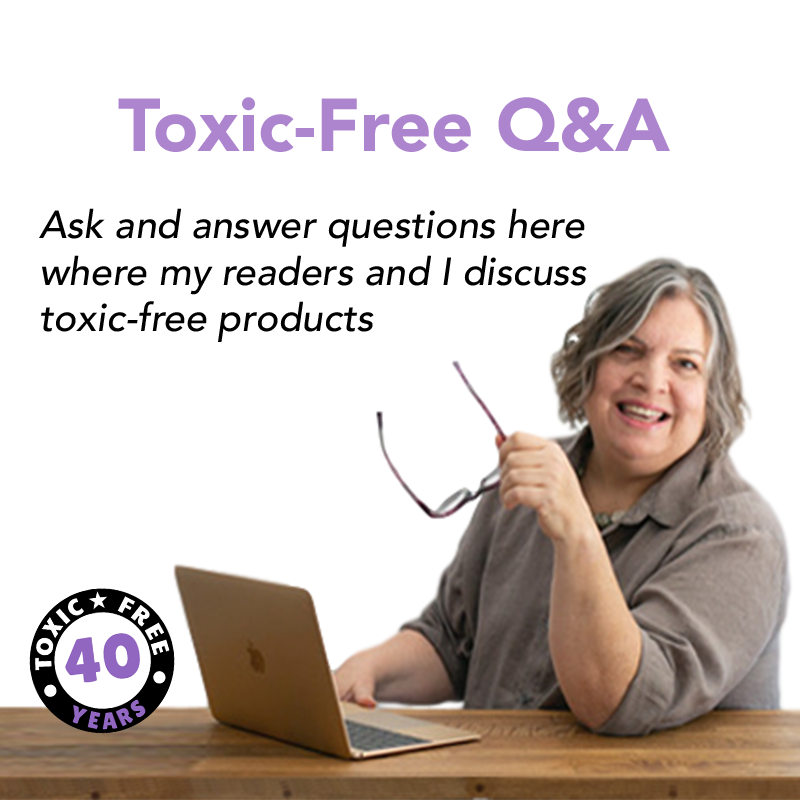
Submitted questions will be posted with my response by the following Tuesday or before.
Submitted comments will be moderated and approved within 24 hours.
Black & Decker Electronic Pest Repellers
Question from Annette Tweedel
We saw this at Walmart and wanted to know if you know anything about this product. The Black & Decker Electronic Pest Repeller, for total home coverage. No poisons, no chemicals or traps. It kills or gets rid of mice, cockroaches, spiders and other pests. You just plug it into an outlet. We have a problem with roaches and I won’t let my husband spray poisons. He put boric acid in a couple of jar lids, and for some reason, it just seems like it does not want to work. When I first saw this product I first thought, does this spray a chemical out or does it have some kind of a smell? And is this good to use for someone with multiple chemical sensitivity like me.
Thank you for your time.
Debra’s Answer
I looked at this online and it appears to be an ultrasonic pest repeller, which uses sound waves beyond the range of human hearing to repel pests. Pests are repelled because they cannot adapt to the constantly changing array of complex ultrasonic and sonic sounds.
I have never used this type of pest repellant, so I don’t know if it works, or what the electromagnetic concerns might be. Readers?
Ideal Coffee Maker
Question from David Myrow
The ideal coffee maker would be glass and (for me) stainless steel and use paper filters, since there appears to be research that paper filters remove some esters which can promote higher cholesterol. Were it not for the paper filter issue, a French press would be ok, but something automatic (e.g., electric) would be even better.
Debra’s Answer
Then I would suggest a Chemex Coffee Maker, which is all glass and uses paper filters.
OxiClean: Is it non-toxic
Question from Lezlie
Do you have any info on OxiClean Versatile stain remover? I have stopped using bleach in my laundry, but my whites started looking so grey. I started using OxoBrite that I purchased at a health foods store, but the OxiClean sells at Costco for so much less and money is tight right now. Also, is Jet Dry toxic? I am just learning about toxic ingredients and sometimes it is overwhelming trying to find out if something is safe or not.
Thank you so much for your help. I look forward to becoming more and more educated in this very important area of my life.
Lezlie
Debra’s Answer
According to OxiClean Versatile Stain Remover MSDS, OxiClean Versatile Stain Remover contains these hazardous ingredients:
The Jet Dry MSDS says, “This product is not considered hazardous according to the criteria of 29 CFR 1910.1200. It does not contain any substance listed in SARA 313. It is not a DOT hazardous material.”
Salad Spinners
Question from Marc
Are there any plastic salad spinners that are safe to use? That do not off-gas or have BPA or phalates in them?
Debra’s Answer
I do not know the type of plastic used to make salad spinners, however, there is a safe alternative, suggested by Martha Stewart. She says, if you are away from home at your summer cabin and do not have your salad spinner with you, simply place the wet lettuce in the middle of a clean kitchen towel, pull the four corners together, take it outside, and spin it over your head. Of course, you need to be outdoors to do this.
I simply wash my lettuce in advance, wrap the damp lettuce in a clean cotton kitchen towel and put it in the crisper. This way it is clean, dry, and ready for me to make a salad immediately at any time, and requires no additional plastic equipment.
neoprene dumbbells
Question from Marc
I just bought a dumbbell made of wroght iron coated with neoprene. Is this material safe to touch and/or does it off-gas? -Marc
Debra’s Answer
Neoprene was the first mass-produced synthetic rubber, made from petrochemicals. It’s chemical name is Styrene (as in Styrofoam) Butadiene Chloroprane Rubber Blend. It was developed and is manufactured by DuPont. It is used for a wide variety of applications, including wetsuits and hoses. It is considered to be “chemically inert.” The MSDS does list hydrocarbons under “hazardous decomposition products” but says only “not applicable” under health hazards data, so apparently there are no health hazards.
Formaldehyde fumes
Question from Roxanne
Can formaldehyde fumes be absorbed through the skin, such as from a new mattress or furniture?
Debra’s Answer
Per The Journal of General Physiology: The Penetration Of Vesicant Vapors Into Human Skin, the answer is YES, chemical vapors can pass through skin.
Hotel room germs
Question from Monica
Dear Debra,
I’ve searched through your list of categories and am clueless if this question has been asked before. If it has, I apologize.
After watching a National Geographic documentary on viruses last night, I began thinking of all the hotel rooms that my husband has to sleep in because of his job. The thought of lying his head down on pillows that have been sneezed on (and who knows what else) really upset me.
Does anyone have any suggestions to sanitize or neutrilize the germs in the bedding? Taking complete bedding with him is not an option as he flys all over the country.
Debra’s Answer
I think what you need is a “germ light”. These are ultraviolet lights that kill germs on services when you shine the light over them. They can be used instead of chemical disinfectants.
There are quite a few germ lights online here. I have no idea which one might be the best.
Lumber for remodeling condo
Question from lmpd42
I wonder whether anyone can recommend lumber with which we can remodel our condo, because I started suffering from multiple chemical sensitivity since our moving into this condo three years ago.
Currently I’m relocated and finally have just started experimenting with lumber.
Unfortunately, we failed with our first experiment with lumber: Many books say that any broad-leaved trees are OK with MCS people, but it turned out to be not necessarily true.
By the way, I live in Tokyo, so the lumber you can recommend needs to be available in Japan. Thank you!
Debra’s Answer
I think you are going to need to find a wood that YOU individually tolerate and have available.
What you want to do is stay away from aromatic woods that have resins, like pine and cedar, probably even fir (commonly used). Hardwoods like oak usually have less odor.
I suggest purchasing small samples of the various woods you have available in Japan, and testing them one by one at home. When you find one you like, buy a little more and continue to test to see if you can tolerate the amount of wood you will need for your remodel.
Glass top stove cleaner
Question from Barbara Osborn
What can I use to clean my glass stove top. I have been using the cleaner that came with it, but doubt it is the safest thing to use.
Debra’s Answer
I don’t have a glass-top oven. Readers?
Laundering “Simply Organic” Sheets
Question from L.A.
I recently bought a set of Simply Organic 100% organic cotton sheets/pillowcases at Bed Bath and Beyond. When I went to launder them before using them, the cleaning instructions on the labels said to “machine wash cold.”
I prefer to wash sheets with hot water. Has anyone who’s used these sheets tried washing with hot water, and did it affect the sheets in any way?
Or is cold water just as effective as hot for sheets and pillowcases?
Debra’s Answer
I have no experience with this particular brand of sheets, however, I can tell you that there are very clear general guidelines about when to use hot, warm, and cold water, from the viewpoint of maintaining fabrics. These guidelines are behind washing instructions found on the label.
That said, on the other hand, the best choice for the environment is to wash items in cold water as often as possible. According to Treehugger, 90 percent of the energy used in washing clothes goes toward heating the water. If you have an electric water heater, pressing the hot/cold button on your washer for one load has the same impact as driving about 9 miles in a car. A gas water heater is equivalent to driving only 3 miles in a car. And when you wash in cold water only, there is 0 production of CO2 for heating water, only the production from running the washing machine.
So the answer to your question is, if you need to wash in hot water to kill germs, go ahead, but it will take a toll on the life of your sheets and contribute more to global warming. Cold water was most probably recommended to preserve the fabric, keep it from shrinking, and save energy.







